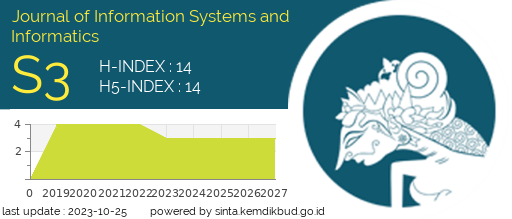Public Opinion Sentiment Analysis Towards Government Budget Efficiency Policy on Twitter (X) Using the Naïve Bayes Classifier Algorithm
Abstract
The government’s budget efficiency program, mandated through Presidential Instruction No. 1 of 2025, represents a strategic initiative to maximize the effectiveness of national (APBN) and regional (APBD) spending while minimizing waste. This policy has triggered diverse public responses, particularly on Twitter (X), which serves as one of the most widely used platforms in Indonesia for expressing opinions openly. This study investigates public sentiment toward the policy by applying the Multinomial Naïve Bayes Classifier algorithm. A total of 1,000 tweets were collected through crawling between January and March 2025 using the keywords “government budget efficiency” and “APBN savings.” The analytical process involved several steps, including text preprocessing, automatic labeling with the Indonesian InSet lexicon-based dictionary, and TF-IDF weighting. The dataset was divided into 80% training data and 20% testing data. Labeling results identified 703 positive tweets and 297 negative tweets. Model performance evaluation using a confusion matrix achieved an accuracy of 77%, precision of 57.14%, recall of 82.76%, and an F1-score of 67.6%. Although this study focuses only on binary sentiment classification (positive and negative), the findings demonstrate that the proposed method is sufficiently effective in classifying public sentiment related to the government’s budget efficiency policy. The results also provide significant insights into public opinion and can serve as a reference for policymakers as well as for future research on social media-based sentiment analysis.
Downloads
References
S. M. Harahap and R. Kurniawan, “Analisis sentimen komentar Youtube terhadap food vlogger dengan menggunakan metode Naïve Bayes,” MEANS (Media Informasi Analisa dan Sistem), vol. 9, no. 1, pp. 87–96, 2024, doi: 10.54367/means.v9i1.3912.
A. N. Hasanah and B. N. Sari, “Analisis Sentimen Ulasan Pengguna Aplikasi Jasa Ojek Online Maxim Pada Google Play Dengan Metode Naïve Bayes Classifier,” J. Inform. dan Tek. Elektro Terap., vol. 12, no. 1, pp. 90–96, 2024, doi: 10.23960/jitet.v12i1.3628.
H. Ashari, D. Arifianto, H. Azizah, and A. Faruq, “Perbandingan kinerja algoritma Multinomial Naïve Bayes, Multivariate Bernoulli dan Rocchio dalam klasifikasi konten berita hoax berbahasa Indonesia pada media sosial,” Proceedings/Repository Unmuh Jember, pp. 1–12, 2020.
W. M. P. Dhuhita and F. Zone, “Perbandingan Kinerja Algoritma Multinomial dan Bernoulli Naïve Bayes dalam Mengklasifikasikan Komentar Cyberbullying,” Komputika J. Sist. Komput., vol. 12, no. 2, pp. 109–117, 2023, doi: 10.34010/komputika.v12i2.9767.
N. K. K. Ardana et al., “Perbandingan Metode KNN, Naive Bayes, dan Regresi Logistik Binomial dalam Pengklasifikasian Status Ekonomi Negara,” Jambura J. Math., vol. 5, no. 2, pp. 404–418, 2023, doi: 10.34312/jjom.v5i2.2110.
I. Juventius, T. Gurning, P. P. Adikara, and R. S. Perdana, “Analisis Sentimen Dokumen Twitter menggunakan Metode Naïve Bayes dengan Seleksi Fitur GU Metric,” J. Pengemb. Teknol. Inf. dan Ilmu Komput., vol. 7, no. 5, pp. 2169–2177, 2023.
W. H. Prasetyo and A. P. Nugraheni, “Analisis Realisasi Anggaran Belanja Dalam Rangka Mengukur Efektivitas Dan Efisiensi Penyerapan Anggaran Belanja Dinas Kependudukan Dan Pencatatan Sipil (Disdukcapil) Kota Magelang Periode 2015 – 2019,” JIMAT (Jurnal Ilm. Mhs. Akuntansi) Univ. Pendidik. Ganesha, vol. 11, no. 1, pp. 1–10, 2020.
M. Z. Arifin and M. SH, Tindak pidana korupsi kerugian ekonomi dan keuangan negara (Perspektif hukum dan praktik), PT Publica Indonesia Utama, 2024.
V. Agustina and A. Herliana, “Analisis Sentimen Publik atas Kebijakan Efisiensi Anggaran 2025 dengan Text Mining dan Natural Language Processing,” Jurnal Media Informatika, vol. 6, no. 3, pp. 2182–2194, 2025.
I. Gunawan and M. Furqan, “Analisis Sentimen Terhadap Tindakan Pemerintah Indonesia Untuk Menampung Sementara Pengungsi Etnis Rohingya Menggunakan Naïve Bayes Classifier Sentiment Analysis of the Indonesian Government’s Actions to Temporarily Accommodate Rohingya Ethnic Refugees,” vol. 9, no. 2, pp. 737–749, 2024.
A. Sitanggang, Y. Umaidah, Y. Umaidah, R. I. Adam, and R. I. Adam, “Analisis Sentimen Masyarakat Terhadap Program Makan Siang Gratis Pada Media Sosial X Menggunakan Algoritma Naïve Bayes,” J. Inform. dan Tek. Elektro Terap., vol. 12, no. 3, 2024, doi: 10.23960/jitet.v12i3.4902.
R. Harahap and E. D. Kurniawan, “Analisis sentimen komentar terhadap kebijakan pemerintah mengenai Tabungan Perumahan Rakyat (TAPERA) pada aplikasi X menggunakan metode Naïve Bayes,” Jurnal Teknik Informatika Unika ST. Thomas, vol. 9, no. 1, pp. 2657–1501, 2024.
A. Salsabila Juwita, A. Rizky Kurniawan, A. Aryaputra Ashari, D. Tyan Putro, V. Nurcahyawati, and H. Artikel, “Implementasi Data Mining untuk Memprediksi Kesehatan Mental Mahasiswa menggunakan Algoritma Naïve Bayes,” KOMPUTEK J. Tek. Univ. Muhammadiyah Ponorogo, vol. 8, no. 1, pp. 61–70, 2024.
D. Puspita Sari, S. Shofia Hilabi, and A. Hananto, “Penerapan Data Mining Metode K-Nearest Neighbor Untuk Memprediksi Kelulusan Siswa Sekolah Menengah Pertama,” SMARTICS J., vol. 9, no. 1, pp. 14–19, 2023, doi: 10.21067/smartics.v9i1.8088.
M. A. R. Sriani and Armansyah, “Analisis sentimen pada pengguna aplikasi Dana menggunakan algoritma Naïve Bayes,” JATI (Jurnal Mahasiswa Teknik Informatika), vol. 8, no. 2, pp. 1470–1476, 2024, doi: 10.36040/jati.v8i2.9041.
C. A. Misrun, E. Haerani, M. Fikry, and E. Budianita, “Analisis sentimen komentar Youtube terhadap Anies Baswedan sebagai bakal calon presiden 2024 menggunakan metode Naïve Bayes Classifier,” Jurnal CoSciTech (Computer Science and Information Technology), vol. 4, no. 1, pp. 207–215, 2023, doi: 10.37859/coscitech.v4i1.479.
A. Laia, “Analisis pemahaman mahasiswa terhadap prinsip transparansi dan akuntabilitas dalam manajemen keuangan publik: Studi kasus pada mahasiswa,” Jurnal Ekonomi Revolusioner, vol. 7, no. 11, pp. 217–224, 2024.
U. Wulandari and R. Paramitalaksmi, “Analisis efisiensi anggaran pasca penggabungan satuan kerja pemerintah: Investigasi pada UPT Balai Pelestarian Kebudayaan Wilayah X,” Jurnal Mutiara Akuntansi, vol. 9, no. 2, pp. 50–61, 2024.
M. Yasir and R. Suraji, “Perbandingan metode klasifikasi Naïve Bayes, Decision Tree, dan Random Forest terhadap analisis sentimen kenaikan biaya haji 2023 pada media sosial Youtube,” Jurnal Cahaya Mandalika (JCM), vol. 3, no. 2, pp. 180–192, 2023.
F. Zamzami, R. Hidayat, and R. Fathonah, “Penerapan algoritma Naïve Bayes Classifier untuk analisis sentimen komentar Twitter proyek pembangunan IKN,” Faktor Exacta, vol. 17, no. 1, pp. 47–57, 2024, doi: 10.30998/faktorexacta.v17i1.22265.
S. A. Albahli, “Sentiment analysis of Twitter data using Naïve Bayes and logistic regression,” Int. J. Adv. Comput. Sci. Appl. (IJACSA), vol. 11, no. 7, pp. 573–578, 2020, doi: 10.14569/IJACSA.2020.0110770.
Y. Zhang, M. Wang, and L. Jin, “Public opinion mining on social media: A case study of government policy sentiment analysis,” Gov. Inf. Q., vol. 40, no. 1, pp. 101–110, 2023, doi: 10.1016/j.giq.2022.101705.
 Abstract views: 43 times
Abstract views: 43 times Download PDF: 24 times
Download PDF: 24 times
Copyright (c) 2025 Journal of Information Systems and Informatics

This work is licensed under a Creative Commons Attribution 4.0 International License.
- I certify that I have read, understand and agreed to the Journal of Information Systems and Informatics (Journal-ISI) submission guidelines, policies and submission declaration. Submission already using the provided template.
- I certify that all authors have approved the publication of this and there is no conflict of interest.
- I confirm that the manuscript is the authors' original work and the manuscript has not received prior publication and is not under consideration for publication elsewhere and has not been previously published.
- I confirm that all authors listed on the title page have contributed significantly to the work, have read the manuscript, attest to the validity and legitimacy of the data and its interpretation, and agree to its submission.
- I confirm that the paper now submitted is not copied or plagiarized version of some other published work.
- I declare that I shall not submit the paper for publication in any other Journal or Magazine till the decision is made by journal editors.
- If the paper is finally accepted by the journal for publication, I confirm that I will either publish the paper immediately or withdraw it according to withdrawal policies
- I Agree that the paper published by this journal, I transfer copyright or assign exclusive rights to the publisher (including commercial rights)






















_1.png)












